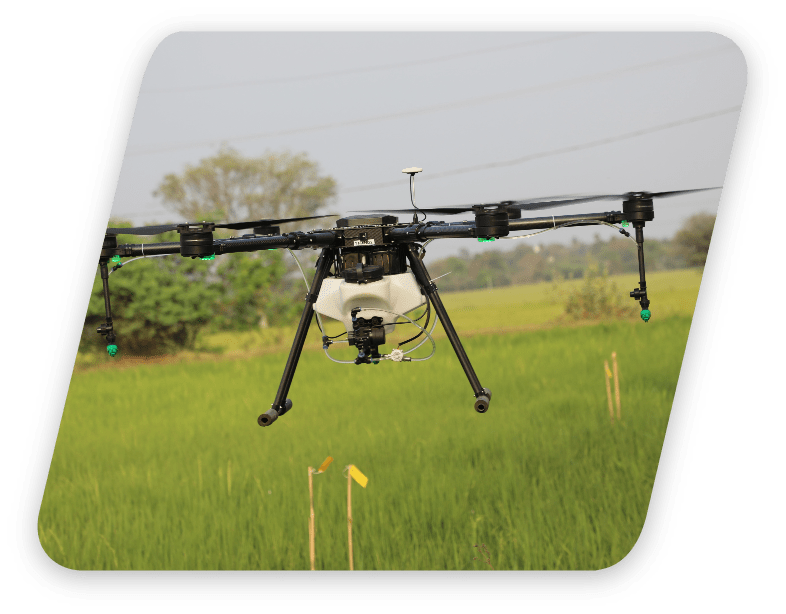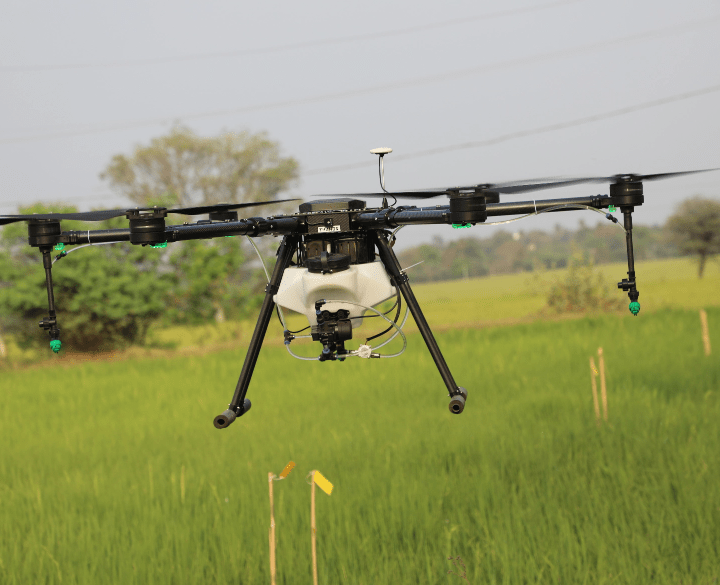Farm Sprayer Drone by Thanos

Despite significant technological advances in various domains in India, agriculture still lags behind in technology adoption. While agri-mechanization technologies, financial products, and supply chain improvements are being introduced, there remains ample opportunity for further enhancement through the adoption of technologies like Agricultural Drones and Spraying Drones, which have proven beneficial in other countries.

34 million farm labourers left agriculture between 2005 and 2012

Farm spraying with agricultural drones saves time by automating the process, efficiently covering large areas with precision and reducing the need for manual labor.

Utilize agricultural drones to save farming costs through efficient operations, precise resource management.
Many agricultural tasks are inherently challenging, compounded by declining manual labor availability and the risks associated with pesticides. Agricultural drones, such as spraying drones, offer a solution by enabling effective and safe spraying operations, enhancing efficiency and minimizing risks for farmers.
Spraying Methods
We focused on solving these problems and developed a much-needed product,SYENA – our UAV-based Agricultural Spraying Platform.
Below is a brief comparison of manual vs. UAV-based spraying methods:
Manual Spraying
Drone Spraying
Coverage
1 Acer/Hour
6/8 Acer/Hour
Water Saving
-
Up to 80%
effectiveness
Non-uniform spraying
Uniform spraying
Cost per use
₹₹₹
₹₹
Safety
Direct exposure to chemicals
No direct exposure to chemicals
Chemical Usage
Over use of chemical
Uses recommended dosage
At THANOS, we’ve developed Agricultural Spraying Drones in various capacities: 5 Litres, 10 Litres, and 15 Litres. After nearly 3 years of trials, demonstrations, and field operations, we’ve found that 10 Litres (or 10 Kg) is the ideal capacity for Agricultural Spraying Drones. We considered factors such as battery capacity, flight time, ease of transport, and spraying efficiency in arriving at this conclusion. With that introduction, we’d like to present our 10 Litre Agricultural Spraying Drone, SYENA-H10. You can see it in action over four different crops in the video below:
Specifications
S.No.
Parameter/Feature
Specification
1
Type
Multicopter Hexacopter X
2
Overall dimensions (l x b x h) in mm
2375mm x 2375mm x 710mm
3
Payload Capacity
10 Litre / 10 Kg (Whichever Is Less)
4
Maximum all-up-weight (including payload) in kg
29.4 Kg
5
Category (As Per Dgca)
Medium
6
Maximum Endurance (hr/m)
18.28 minutes
7
Battery Charging Time
60-75 MinutesX
8
Spray Width
3 – 5 Metres
9
Flight Mode Options
Manual / Semi-Autonomous / Autonomous
10
Wind Resistance
Level 5 As Per Beaufort Scale
11
Flight Speed
Upto 10 M/S (Recommended Upto 5 M/S)
12
Frame Material
3 K Carbon Fibre
13
Other Features
Gps And Radar For Uniform, Efficient & Precision Spraying – Continuous Operation Data Monitoring

The SYENA-H10 Agri-Drone has undergone multiple seasons of trials and covered thousands of acres in spraying pilots and demonstrations over the past 5 years. It has been optimized for continuous field operations. The following are the work rate capacities of the SYENA-H10 Agri-Drone:
Please note that these work rates are estimates based on assumed spray volume rates for 5 hours of daily operation. They should not be considered as dosage recommendations for spraying. The correct spray dosage should be confirmed with the agri-chemical manufacturing company or the local distributor before commencing any operations.